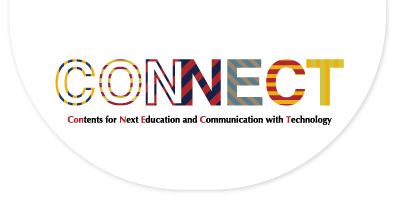TopicsTeacher Interview
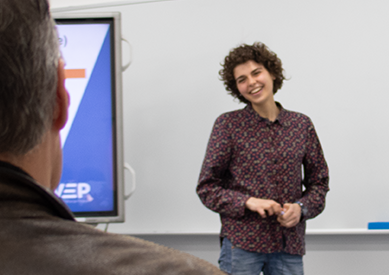
Workshop: Expand your borders, experience Virtual Exchange!
Published online: April 12, 2021
On March 12, 2020, the Center for the Promotion of Excellence in Higher Education, Kyoto University, held a workshop entitled "Expand your borders, experience Virtual Exchange!" The workshop theme was the Virtual Exchange Program (VEP),* a global education program in which leading international universities participate.
The workshop invited a guest speaker, Ms. Iris van Hal, who is involved in VEP at Wageningen University & Research, the Netherlands and a member of the Open & Online Education team. The event discussed the possibilities of novel learning programs opened up by virtual exchange using online lectures. Twenty-five faculty members and graduate students participated in the workshop.
* Here is an article about the VEP. In addition to Wageningen University & Research, member institutions include Delft University of Technology, the Netherlands; Rice University, the United States; the Hong Kong University of Science and Technology; and other leading international universities.
Program
Thursday, March 12, 2020. Room 201, Yoshida-South Campus Building No. 1
Moderator: Mana Taguchi (Associate Professor, Center for the Promotion of Excellence in Higher Education)
Lecture
12:00-12:20: "Expand your borders, experience Virtual Exchange!"
Ms. Iris van Hal (special research student, Graduate School of Economics, Kyoto University/graduate student, Wageningen University & Research, the Netherlands)
Group Work and Questions and Answers
12:20-13:00 Theme: How do you envision the future of (online) education?
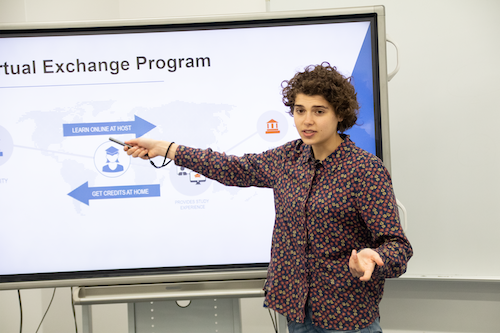
Ms. Iris van Hal delivering her lecture
Click to view the video of the workshop (Source: Kyoto University OCW).
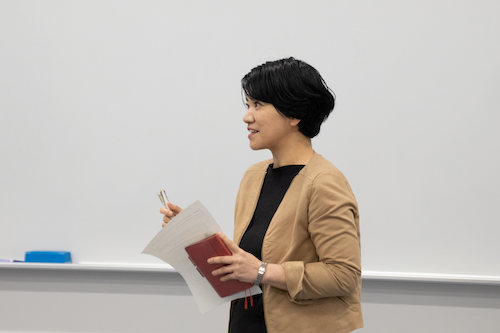
Associate Professor Taguchi, Center for the Promotion of Excellence in Higher Education, moderating the workshop.
Workshop Outline
Following her self-introduction, Ms. van Hal outlined the VEP as following. The VEP is a MOOC-based inter-university credit transfer program. Students of a partner university select credit-earnable courses offered by other partner universities and enroll them after following the procedure at their own university. After taking the course, they can earn credits at their university by fulfilling a specified set of conditions, including passing the final examination for program participants.
Ms. van Hal mentioned a couple of features of the VEP: students can take lectures provided by foreign universities and earn credits, in the same way as study abroad programs in general that involve actual international travels; in the VEP, students can gain learning experiences beyond national boundaries regardless of temporal and spatial constraints, thanks to the program's versatile online learning style.
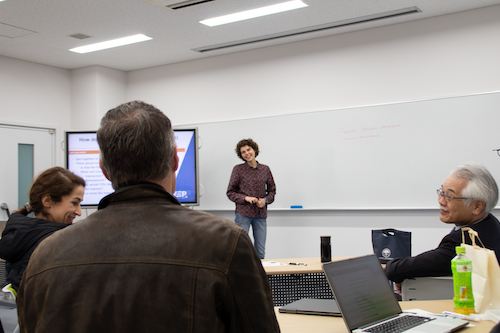
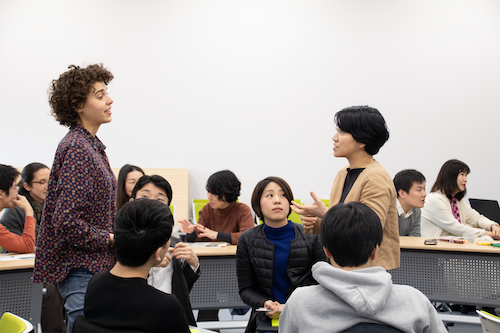
The lecture was followed by a short question-and-answer session, then by a group discussion session. The discussion theme was "How do you envision the future of (online) education?" The participants discussed the diverse situations in higher education expected to arise in the future, from the perspectives of quality assurance, accessibility, and sustainability, as well as the potential of the VEP and other online education/learning programs.
Here are the comments (excerpts) from the group work.
- Comments Excerpted from the Group Work
-
-
Learning Environment Creation
- How should we think about learning environments or learning ecosystems? Online education/learning is undoubtedly attractive, but it seems that some learning experiences can only be provided in a classroom setup.
- (In response to the comment above) Blended educational methods such as online lecture-based flipped classrooms and collaborative learning seem to have a huge potential for providing classroom experiences in combination with online education.
- For instance, Collaborative Online International Learning (COIL) is an educational method designed for students to have online exchanges with foreign universities.
(COIL: An educational technique/program developed in 2006 at the State University of New York (SUNY) for providing collaborative international learning online. Reference: SUNY COIL Center website) - I think we need to consider how to promote community building among students in fully online learning settings, which students can build easily in a classroom setup with face-to-face lectures.
- VEP and other online education/learning programs can be a solution to exceptional situations such as the outbreak of COVID-19 and climate calamities. However, how can we solve the issue of accessibility in online education?
- For example, some Japanese students do have smartphones but not personal computers. The digital divide seems to be an important issue.
- I feel it is necessary to consider how we can continue to provide the resources required for the production of online education programs.
Student Communities Creation
Accessibility
Sustainability
Post-Workshop Questionnaire: Results and Comments
We asked the participants to rate their workshop experience, and twenty-one participants (84.0% of all questionnaire recipients) responded to the post-workshop questionnaire. The significance of the workshop was rated on average 4.75 on a five points scale. The questionnaire also asked their comments on the workshop in an open-ended format, as summarized below.
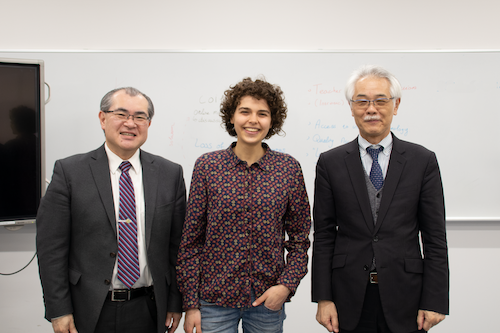
Commemorative photo after the workshop
Masao Kitano (right), Executive Vice-President for Education, attended the workshop despite his busy schedule. At left is Toru Iiyoshi, Deputy Executive Vice-President for Education/Director & Professor, Center for the Promotion of Excellence in Higher Education.
Comments (Excerpts)
- It was a valuable opportunity to know the efforts of other universities working on online education. I'm sure that students will be highly motivated if they can earn credits through online learning. I hope that such a system will be introduced more broadly someday, even to a limited extent.
- This was helpful in anticipating what the requirements for online courses will be. I learned about COIL, which I will learn more about. This was very useful.
- I was impressed and excited by the fact that the workshop was proposed and organized by a positive and active graduate student. Thank you for giving us a fantastic opportunity.
- Thank you! It was fun and it is good to think of the future how we can make it better.
- This workshop was a wonderful opportunity to reconsider what a university is (and what functions it serves).
Published online: May 12, 2020 (Original article)
April 12, 2021 (English article)
